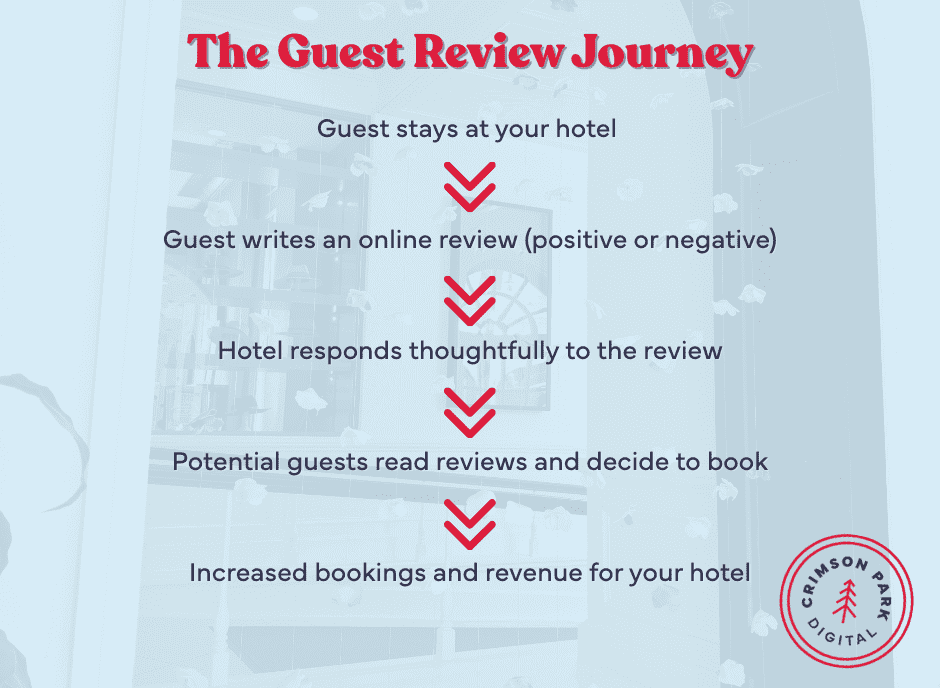Why Hotel Reviews Matter More Than Ever
Travelers used to rely on brochures, travel agents, and word-of-mouth from friends. Now, they want real stories from real guests: the good, the bad, and everything in between.

Reviews matter because they:
- Give social proof: People trust other travelers more than they trust your marketing copy.
- Tip the decision scale: If two hotels look similar, the one with better reviews almost always wins.
- Impact SEO: Search engines love fresh content, and guest reviews deliver it.
- Build trust instantly: A solid average rating can make guests feel confident booking—even at a premium price.
Ignore them, and you’re basically letting your online reputation write itself.
The Platforms You Can’t Afford to Skip
If you’re trying to keep tabs on every review site out there, you’ll burn out fast. Instead, focus on the ones that actually influence bookings:
TripAdvisor is still the heavyweight champ of travel reviews.
Google Reviews matter for local search (and show up before people even click through).
Booking.com draws in guests with its huge user base and verified stays.
Yelp is more common in North America, but don’t underestimate its sway.
Hotels.com offers loyal customers an easy place for them to share feedback.
These aren’t just “nice to monitor.” They’re the places your guests are making, and breaking, decisions.
The Review/Revenue Connection
Here’s the reality: a handful of good reviews can help you fill rooms faster. A handful of bad reviews—especially unanswered—can tank occupancy.
Positive reviews:
- Enhance your perceived value.
- Justify higher rates.
- Attract more direct bookings.
Negative reviews:
- Scare off new guests.
- Reduce your competitive edge.
- Chip away at your search rankings.
If you’re serious about profitability, reviews aren’t optional. They’re a core revenue driver.
Building a Reputation Management Strategy
This isn’t about “replying when you have time.” A great reputation is built with intention.
Start with:
- Daily monitoring so you know what’s being said and can spot patterns early.
- Staff training that ensures every guest interaction is review-worthy.
- Highlighting strengths, whether it’s your killer breakfast buffet or unbeatable location.
- Fixing recurring issues before they become the most common theme in your feedback.
Small actions add up. Over time, you’ll notice a shift in tone, star ratings, and guest loyalty.
The Art of Responding (Even to the Tricky Ones)
Responding to reviews is your chance to show personality and professionalism at the same time.
For the great reviews: say thanks, mention something specific from their stay, and let them know you’d love to welcome them back.
For the not-so-great reviews: stay calm, acknowledge the issue, and share how you’re addressing it. This shows future guests you take feedback seriously.
For the downright odd reviews: keep it light but professional. Your measured tone can sometimes make the review itself seem unreasonable, without you ever saying it.

Getting More Positive Reviews Without Being Pushy
Encouraging guests to leave reviews doesn’t have to feel awkward or forced. You don’t need to slip a “Please review us” card under their door or corner them at check-out. Instead, focus on making the request feel natural, well-timed, and connected to the great experience they’ve just had.
One of the easiest ways to do this is to ask for a review when guests are at their happiest. Maybe that’s right after they’ve enjoyed an incredible dinner at your restaurant, participated in a memorable event on the property, or experienced an easy, stress-free check-out. These are the moments when positive feelings are at their peak, and guests are far more likely to take a few minutes to share them.
You can also make the process seamless by including direct review links in your follow-up emails. A quick “Thanks for staying with us—tell us how we did!” message, with a single click to the review page, removes any barriers and makes it effortless for guests to respond.
And never underestimate the power of a small, delightful surprise. Whether it’s an unexpected room upgrade, a personalized note, or complimentary snacks, those little extras stick with people. When guests feel genuinely cared for, they’re naturally inspired to share their experience with others.
Turn Reviews Into Marketing Fuel
Your best reviews shouldn’t just live on other websites; they should be part of your own marketing.
Try:
- Featuring them on your homepage.
- Pairing them with guest photos on social media.
- Weaving them into your email newsletters.
They’re guest-written testimonials you didn’t have to pay for. Use them.
Make It Easier With the Right Tools
Sure, you could hop between TripAdvisor, Google, Booking.com, and Yelp every day, but why not make your life easier?
Reputation management software can:
- Pull reviews into one dashboard.
- Alert you to new feedback instantly.
- Analyze trends so you can improve strategically.
And if you work with a digital marketing agency (hi, that’s us), you get access to these tools and the expertise to turn the insights into bookings.
Avoid These Reputation Killers
Some of the most common mistakes we see hotels make:
- Ignoring reviews entirely.
- Getting defensive in responses.
- Letting weeks go by before replying.
Your online reputation moves fast. So should you.
The Bottom Line
Reviews are one of the most powerful marketing tools your hotel has. They influence perception, affect both traditional SEO and AI-driven search, and directly impact your revenue.
You could manage them on your own, but keeping up with every platform, responding in real time, and using reviews as part of a bigger marketing plan is a lot to juggle.

That’s where we come in. We help hotels turn reviews into revenue with a smart, strategic approach that works around the clock, so you can focus on giving guests a stay worth raving about.
Ready to turn your reviews into your hotel’s best marketing asset? Let’s talk.


